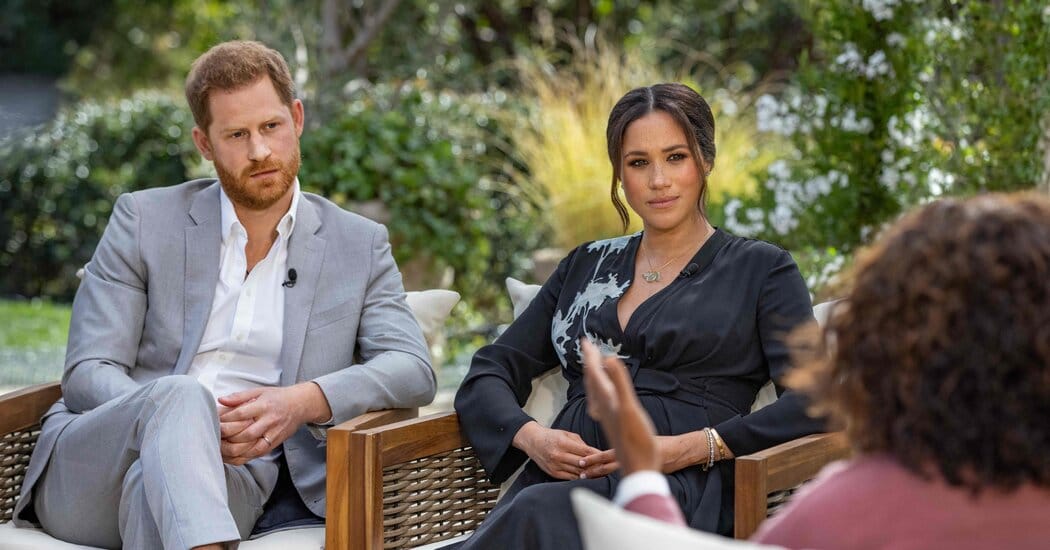Provocative Perspectives: TV proves it’s still the driving force of national conversation
Unless you’ve been living under a rock for the past week you would have heard about, and most likely watched, the highly anticipated Meghan Markle and Prince Harry interview with Oprah Winfrey.
The tell-all interview was the talk of the internet on Monday (08 March) evening after 12.4 million viewers tuned in to ITV for the two-hour special. Set in a beautiful California home, Meghan and Prince Harry shared their stories and experiences of becoming the Duke and Duchess of Sussex, welcoming baby Archie, and everything that followed…
It’s absolutely no surprise that the British public gathered at their TV screens to watch with a cup of tea in hand to discover the latest Royal scandal.
Pulling in ITV’s highest ratings of 2021, this interview has very quickly become the most watched programme of the year so far. To go even further, it was ITV’s largest peak audience since the Rugby World Cup Final in 2019.
The most surprising of viewing figures came from the 16-34s demographic, also known as the “hardest to reach on TV” audience due to their tech savvy persona. A staggering 2.4 million 16-34s tuned in to watch the interview as it aired, bringing in more viewers than the Love Island launch episodes in 2019 and 2020!
Fitting nicely into ITVs prime time 9:00pm spot, the interview reached its peak viewership at 9:15pm when Meghan was alone discussing her relationship with the Duchess of Cambridge, Kate Middleton, and then again at 10:00pm when she was joined by her husband, Prince Harry. The peak and average viewing numbers were also quite close giving us the view that a large proportion of the audience stayed glued to their screens for the full time, despite the programming that was showing on competing channels such as MasterChef, 24 Hours in A&E, Love Island Australia and the West Ham v Leeds game.
But why did so many tune in? I think it’s safe to say that we all like to be part of what everyone else is talking about and it goes back to the strength of TV and those ever-important watercooler moments. This interview acted as a domino effect and off the back came multiple conversations and debates online, as well as ITV’s very own Piers Morgan storming off the Good Morning Britain (GMB) set after being called out by his colleague Alex Beresford. It was clear, that everyone wanted to share and hear opinions of what we had learnt in the 1hour and 50mins.
The buzz around the interview ignited further TV viewing spikes. Monday (08 March) morning’s GMB beat their all-time highest ratings, peaking at 37% share and on Tuesday (09 March) beat BBC breakfast ratings for the first time in history.
Looking at Google Trends for the UK, there was a spike in interest and searches for the term ‘Meghan Markle’ in the run up to Monday’s interview (08 March). Building up to March 8th, the day before the interview aired in the UK (Sunday 07 March) there were more than 10 million Google searched for her name. The following day at 9:00pm we see interest reach its highest point. This shows us that while the interview is playing out, viewers are dual-screening and gathering further information to ensure they’re in the know and can form an opinion. So much so that related topics of interest included body language, Tyler Perry, Racism, Piers Morgan, Meghan’s father, and Princess Diana.
We know that people on Twitter love TV and often have two screens going as they watch. One thing that Twitter does well is bring people together, in a connected world when they are watching great TV content. It’s fair to say that this interview created a huge social buzz. Over the last seven days #MeghanMarkle reached roughly 17 million people across Twitter and Instagram. Most of this traffic coming from Monday (08 March) and Tuesday (09 March) with people wanting to voice their opinions and get involved in the conversation.
Twitter erupted with users creating memes, explaining conspiracy theories, holding conversations on British historical references, and mostly giving their thoughts on whether Meghan was telling the truth. Like with any scandal, it was evident from the social chatter that the interview divided the nation.
Other hashtags such as #MeghanandHarryonOprah and #MeghanandHarry also saw an influx in traffic both delivering a reach of c.5 million over the last week.
This shows us that TV, even in a declining linear marketplace, is the driving force of national conversation.
TV bashing is a constant with claims such as “TV is dead” and “Who watches live TV these days?”. In some ways, it’s understandable why some have those opinions. We’ve seen an influx of VOD content as popular streaming services such as Netflix and Disney+ share more and more content. However Monday (08 March) nights stats speak for themselves.
TV is not dying, it’s evolving. The way we consume it is merely changing. We can now consume the same premium content on the move on our phone or in the bathtub on our tablet, the choice is endless.
The ripple effect that was created from this interview is evident across ALL platforms, and it shows that TV still has a huge impact on informing our opinions and conversations we have. One of the reasons that people watch TV is to ensure they’re in the loop with what the rest of the country are watching and discussing. No one likes missing an episode of The Masked Singer and not being able to speculate who is the sausage online and with friends and then reading a spoiler about who was under the mask! People choose to watch in real-time to be involved in the conversation whether that be virtually or not. This is why TV is still the driving force for national conversation.
It gives a sense of unity to a group of people, something you all have in common and can share with one another. Even stepping away from the Meghan and Prince Harry example specifically, we see it all year around. The minute Christmas adverts get released social media blows up with everyone’s opinion on which they like and dislike most. When Love Island is on you can’t sit in your office quietly without overhearing a spoiler. During the World Cup 2018, the words “Football’s Coming Home” were not only plastered everywhere online, but even if you walked down the street you were bound to hear someone say it.
So, with the right content TV is still capable of delivering an unbeatable large audience. With that, it does continue to create a national conversation on and off screen.
Written by Sofia Peixoto, Media Manager AV











